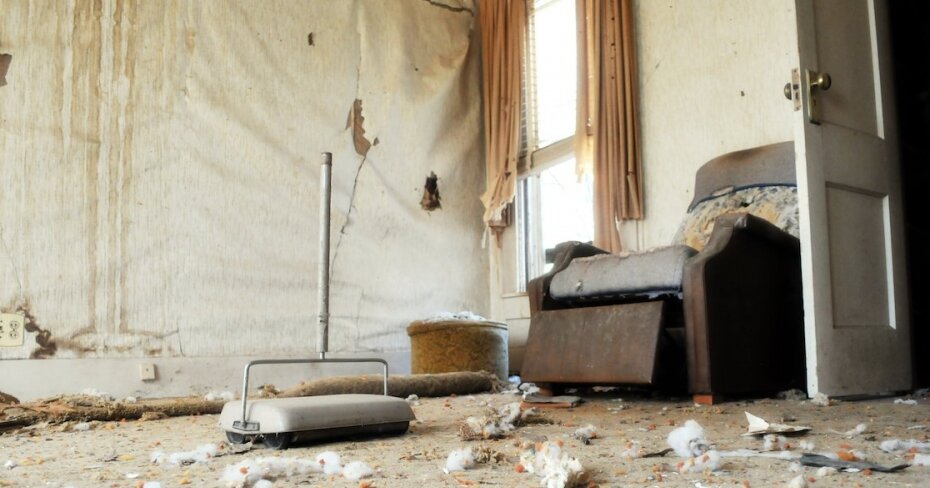What to do if your rental isn't ready on move-in day
By: Dominic Licorish on September 18, 2017
It’s moving day. After spending days packing all your things up and cleaning your old place, you’re finally ready to move in to your new pad. But when you get there and open the door, there’s dust everywhere, the kitchen is missing half of its appliances, and there are holes in the walls from where the electrician had to redo the wiring in your room.
The landlord, an anxious ball of stress, is running around like an insomniac chicken. He’s sorry, he says, but delays with contractors and unexpected setbacks have left renovations behind schedule. It’s not ideal, but there’s water, there’s electricity. You could tough it out here until the renovations are done.
But should you?
It happened to me
Last month, I finally found a place to rent now that my credit score is no longer an issue. My new place is located in a quiet, up-and-coming Toronto neighbourhood with walkable access to public transit. I have great housemates, all the amenities one needs in a home, and even affordable rent. The only problem was that for the for the first month of my lease, the house was going to continue to be under renovation.
I was pretty lucky. Living at my parents’ house meant I didn’t have to move exactly on the first of the month, and a two-week trip to Europe meant I didn’t have to be around for most of that first month anyway. But for those that aren’t so lucky, arriving at a new home, only to find it’s not ready, can be a costly and disruptive problem.
To make things more complicated, my landlord is also my friend, and I was well aware of how stressed he was trying to get the house ready. Was I really going to get on his back about the state of the house when he was already losing his mind over it?
There are plenty of reasons a unit might not be ready on move-in day: maybe the previous tenant hasn’t fully vacated the unit, maybe the unit hasn’t been cleaned properly, maybe the water heater doesn’t work.
Whatever the reason, you’re going to want to get it fixed ASAP, and if it can’t be fixed right away and is going to negatively impact your life, you may feel entitled to some sort of compensation or discount on your rent. After all, you signed the lease expecting a fully functional home.
So what can you do?
Looking for answers, I got in touch with Kenneth Hale, director of advocacy and legal services at the Advocacy Centre for Tenants Ontario (ACTO). It turns out, that in Ontario at least, the Residential Tenancies Act has the tenant’s back when it comes to a unit’s compliance with health, safety, housing, and maintenance standards — even if they were made aware of any deficiencies before taking the unit.
“This obligation can be enforced by the tenant making an application to the Landlord and Tenant Board,” says Hale. “When the application is received (filing fee of $50, $5 discount for e-filing) a hearing date is set and the parties notified.”
If repairs are still needed, the Board could order the landlord to do the repairs or authorize the tenant to carry them out at the landlord’s expense. If the unit is deemed uninhabitable (e.g. there’s black mold in the bathroom) the tenancy can be legally terminated.
Depending on the result of the hearing, the tenant could be awarded a reduction in rent for the time the unit was out of repair, as well other costs the tenant may have incurred as a result of the issue (such as hotel costs). However, that reduction might not be what you’re looking for. According to Hale, the tenant may even get nothing if the landlord’s conduct is found to be “reasonable”.
What about situations not covered by the Tenancies Act?
Because my landlord and I share a kitchen and bathroom, it excludes our rental situation from falling under the Residential Tenancies Act in Ontario. So what could someone in my position do? Unfortunately, there’s not much.
If for any reason you’re not covered by the Act, you will need to take matters to the courts or settle things yourself. Depending on your relationship with your landlord, this could be the best option. Especially if you’re friendly with each other. Otherwise, you could take them to court and in that case, both parties’ rights will be determined by the terms outlined in your rental agreement.
In the end, I “toughed” it out and didn’t ask for a rent reduction. Eventually, the renovations were completed, and I’m settled into my new house. Thankfully, none of the repairs were for anything life-threatening or dangerous, but it’s also why it wasn’t worth it for me personally to press the issue.
If you’re renting property and feel unsure about an issue with your tenancy, reach out to an advocacy group such as ACTO get help for free right away.


.jpg?itok=tIiHyjyb)